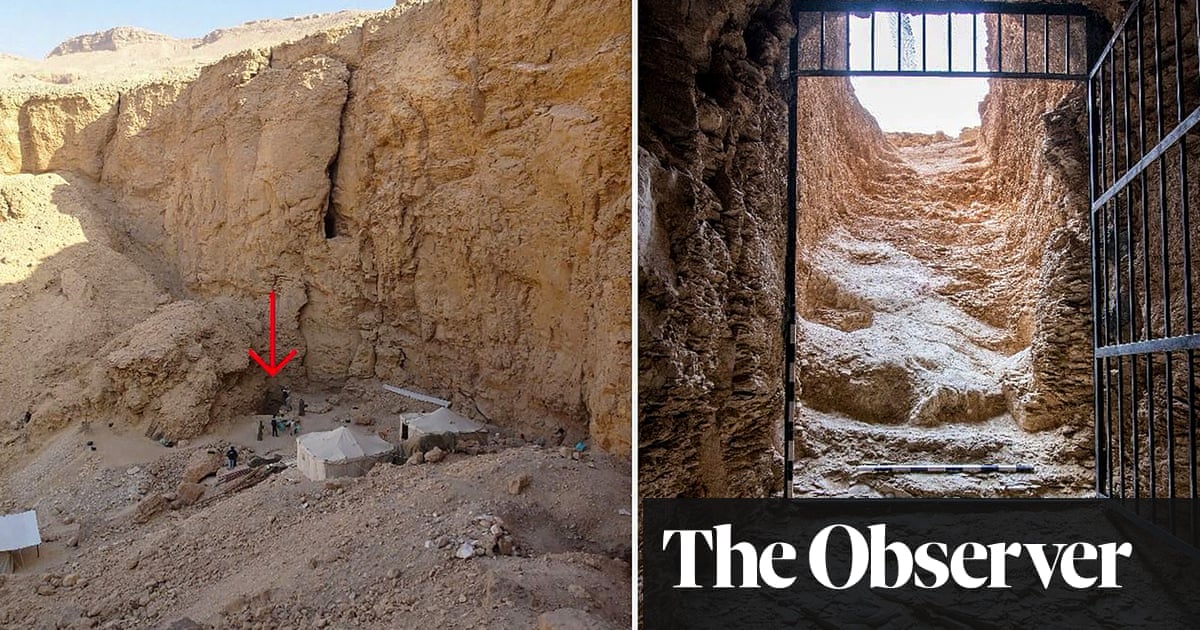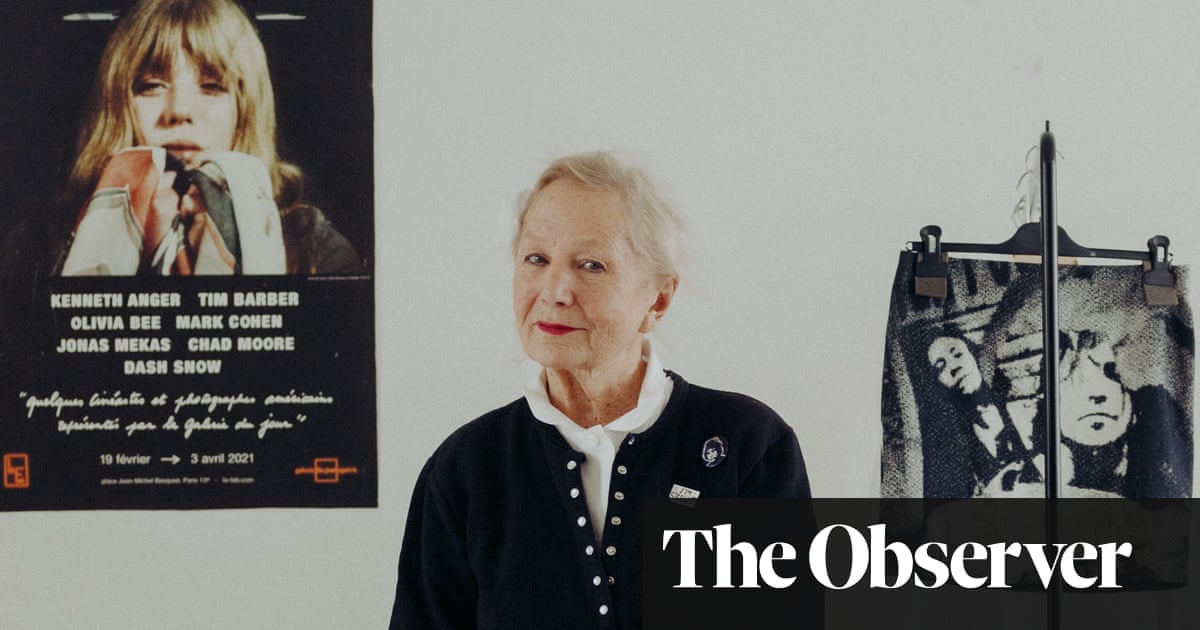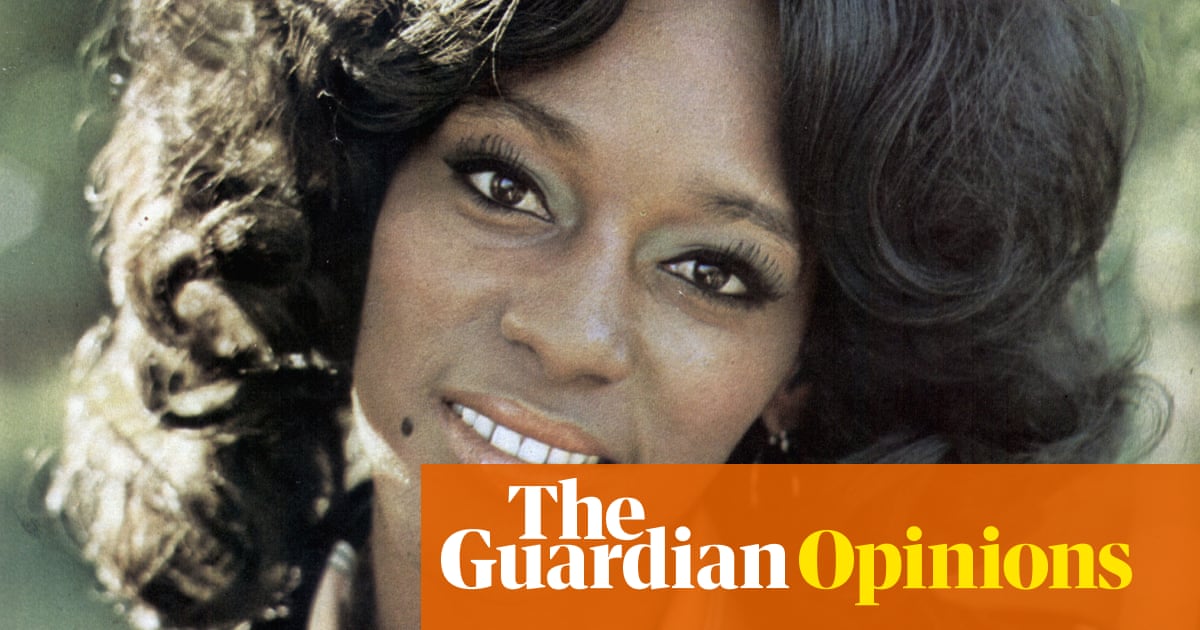Maybe it’s because Paul Mescal in Gladiator II is younger than Russell Crowe was in the original (Mescal was 27 and Crowe was 35 during filming). Or maybe it’s because Mescal has a wry, sunny energy, and Crowe something more like the bright red character in Inside Out (what’s his name again? Oh yes, Anger)? It’s something, anyway, because the two films, both directed by Ridley Scott, give us two different versions of masculinity – not just in terms of the actors’ vibes, but how they deal with women, geopolitics and battle. And also how they see humour and sexuality. So what has changed for men in the 24 years between each release?
It’s impossible to overstate how much impact Crowe had when the first film was released in 2000. We used to talk about it at the level of the sentence. I lost an awesome amount of time arguing over a line in the opening sequence, where Crowe says, “At my signal, unleash hell.” Did he mean let loose the demons of soldiery? Or was his dog called Hell, and he wanted him off the lead so he could run about in a helpful way?
It was Sex and the City that got to the crux of the matter the following year, when Samantha, Miranda, Charlotte and Carrie are talking about who they fantasise about. “Russell Crowe.” “What did women do before Russell Crowe?” “George Clooney.” “Clooney’s like a Chanel suit.” “He’ll always be in style.” Crowe was not then, as the character Maximus Decimus Meridius, and never has been since, anything like a Chanel suit.
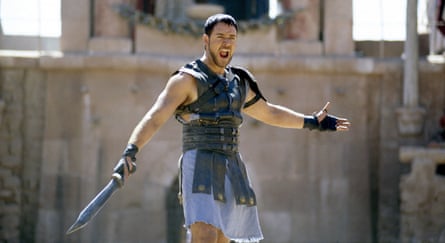
Hollywood’s idea of the male ideal swings, pendulum-style, from the urbane to the pre-verbal, from man-about-town to man-about-cave, from Cary Grant to Marlon Brando, George Clooney to Russell Crowe. Crowe’s pugnacity manifested on and off screen. He argued with Scott; with one of the producers, Branko Lustig; with the writers. The line of dialogue people would quote at each other in pubs, for years – “My name is Maximus Decimus Meridius … father to a murdered son, husband to a murdered wife. And I will have my vengeance, in this life or the next” – Crowe initially refused to utter, because he said it was terrible. Filming in Morocco, he was asked to leave the military-owned mansion he was staying in. David Franzoni, the producer who first pitched the idea of a gladiator film to Steven Spielberg, recalled later that he was told by a man in a military jeep that Crowe had “‘violated every tenet of the Qur’an’. I had no fucking idea what he was talking about! Drinking? Carousing? Cursing? I don’t know!” To be fair, the film didn’t create this monster. Crowe’s history included allegations of him punching a co-star in Blood Brothers in 1988 and, in 1998, claims about an altercation in a Sydney nightclub.
But whether by accident or design, Crowe’s rough edges come off in Gladiator as a determined lack of jokes, almost an anti-humour. Real men have a granite visage and do not caper about. There are only two jokes in 155 minutes, and the first is more grim, tough-boy humour than an actual belly laugh – Maximus’s rallying cry in the opening battle: “If you find yourself alone, riding in the green fields with the sun on your face, do not be troubled. For you are in Elysium, and you’re already dead!” The second was apparently ad-libbed, when Maximus is given his dinner in the prisoners’ compound and another gladiator (the gigantic stunt man Ralf Moeller) samples it, then pretends it has poisoned him. Moeller says this scene came about because “Ridley came up and said, ‘There are no funny scenes where you guys smile!’” It’s a fair point – this is the only time Crowe smiles – but Scott was the director, so he probably could have done more about that.
Paul Mescal’s performance as Lucius is the polar opposite of Crowe’s. Sure, there is more wit in his script, but even when he isn’t talking, the look on his face suggests he has just thought of something droll and he’ll tell you later. He’s not taciturn. He quotes Virgil.
Entirely unrelatedly, there is no historical record as yet of Mescal behaving like “a handful” on set (as Franzoni desribed Crowe). He clashed with Scott over one thing, he told Variety, which was that he wanted to do a stunt on a horse, and Scott changed his mind about it and said no. Why? Because the director had been burnt before, when Keith Carradine broke his leg in 1977, on the set of The Duellists (Mescal was allowed to do the stunt in the end). Unlike Crowe, Mescal’s presence is boyish, ungruff, a little more textured, in the sense that you can believe that “rage pours out of [him] like milk” (as Denzel Washington’s politicking gladiator-keeper Macrinus says). But you could not imagine him being rude to a waiter or, the Roman equivalent, a slave.
Oh yes, slavery; interpersonal political relations have changed quite a bit for ancient Romans between 2000 and 2024, which would come as a surprise to them, given that they’ve been dead that entire time. The first film strikes some distinctively pre-9/11 notes on the subject of territorial conquest. (“People should know when they’re conquered,” Quintus says of the angry Germans, to which Maximus replies, “Would you? Would I?” An unruly guerrilla army of true, macho patriots used to be a dramatic staple, and that really got fudged after 2001, when all violence except that of the state went off limits.) But the first Gladiator is not especially concerned about enslavement, except as a plot point to square off the contradiction of the hero – plainly an introvert who wants to die, having lost his loved ones, but who is still fighting like the devil to remain alive. “Win the crowd and you win your freedom,” Maximus is told by Antonius Proximo, the trainer who was played by Oliver Reed, the only actor who proved more of a problem to the production than Crowe himself. Reed died of a heart attack before he had shot all his scenes, and for the last ones, images of his face from existing rushes had to be grafted on to a body double.
In 2024, slavery and the violation it constitutes is much more graphically drawn; Scott, never scared of injury detail, adds a lot of injury context. The slave-branding early on is more stomach-turning than any amount of arm-chopping-off that comes later; you can almost smell burning flesh. The branding is a motif that returns to explain Macrinus’s animus towards Rome and everyone in it, which puts him in a moral bracket all his own, neither villain nor hero, absolved from judgement by a historic wrong.
Gender politics, too, have changed. You can no longer be the love object of one of these bros just by smiling and looking nice. Maximus’s wife existed only as the woman he failed to protect, which was understood as an unsurvivable psychic wound without any need to explain what, exactly, was so great about her. Lucius’s wife, by contrast, is a warrior in her own right, because of course she is. The TikTok generation just would not accept a female character that was nothing but Wife. If you don’t believe that, you’ve clearly never tried to watch Hannah and Her Sisters with 14-year-olds. They don’t just decry everything about it, they blame you for the existence of Woody Allen.
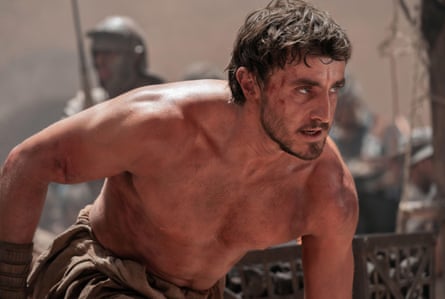
Just as pronounced is the completely rebooted attitude to sexuality – and this is much more about cinematic norms than social ones. As Mescal said in an interview with Attitude magazine, “I think this film is for the guys, the gays, the girls, the mums, the dads … That was true of the first film, weirdly.” It’s true that Gladiator’s gay stans were (Roman) legion, but there is absolutely no acknowledgement in the first film of the existence of homosexuality, which is plain weird when you consider how quotidian it was in ancient Rome. In Gladiator, the boy Lucius was the son of Lucilla (played by Connie Nielsen in both films) and her deceased husband. In Gladiator II, Lucius couldn’t possibly be his putative father’s son, because Lucius Sr was gay. This is hardly radical in 2024, but it’s surprising how visible and persistent homophobic prudery has been in mainstream cinema where it takes a shot at ancient Rome. In 1960, Stanley Kubrick’s Spartacushad a bath scene between Laurence Olivier and Tony Curtis. “Do you consider the eating of oysters to be moral and the eating of snails to be immoral?” Olivier asks, before concluding “my taste includes both snails and oysters”. The scene was cut for reasons of decency. The tension between cinema’s irresistible appetite for retelling the classics, while maintaining an omertà on anything that is not cis-het sex from that era, has been bizarre. So it’s great to see that resolved, finally. Well done, everybody.
One thing that has remained the same is the physicality and the battle smarts of a gladiator. But because this is the age we’re in, we know a lot about how Mescal beefed up for the part, a change which will be particularly arresting if the last time you saw him was as a comparatively lanky student in Normal People. Tim Blakeley, the personal trainer to the stars who worked with Mescal before filming, has described how “he didn’t want to go down the Marvel route of looking cartoony – we were thinking back-row rugby player type; strong, fit, fast and agile like a decathlete”. Crowe looked the same in 2000, but we sure as hell didn’t hear about his protein consumption, and you have to admit there were some things about the past that were better.
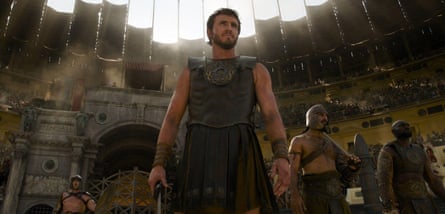
As for the battle scenes, Scott remains peerless, I think, for his sheer ingenuity in how he handles them, their pace and internal narrative. It’s an art to present a hero with odds that look impossible, and yet have him credibly beat them. Sure, I can tolerate what we might call the Marvel solution – wow, he took on 200 much larger foes and then there were some noises, and now he’s won! – but you can see the difference when someone has taken the trouble to make it make sense.
Earlier this year, Crowe allowed that he had misgivings about this sequel. “A couple of things that I’ve heard,” he said, “I’m like, ‘No, no, no. That’s not in the moral journey of that particular character.’ But you know, I can’t say anything. That’s not my place. I’m six feet under. So we’ll see what that is like.” In fact, all the central characters bar Lucilla are new, and Pedro Pascal’s army dude is almost respectfully close to Crowe’s. But you can see a new version of a man in Gladiator II, and in him, a new version of the world. So you can take Crowe’s point, “what was wrong with the old version?”, even if your answer would be, “Well, OK, just a couple of things. Let’s start with grumpiness …”
Undeniably, though, Russell Crowe’s performance felt more committed to the business of gladiator-ing. There’s contradiction in any fighting genre – violence is evil, violence is fun to watch – but gladiator yarns are made of cognitive dissonance. “Are you not entertained?” Crowe bellows at the Roman crowd, his moral imperative plain: someone’s just had their head chopped off, you bunch of absolute psychos. Likewise in Gladiator II, arguably even more so, we sit in judgment while simultaneously revelling in the same spectacle that the psychopathy has conjured. Those two opposing ideas are probably best united in a gladiator who doesn’t really say much.

 3 months ago
63
3 months ago
63


